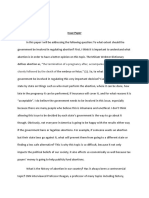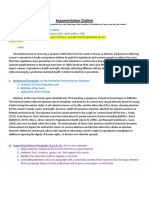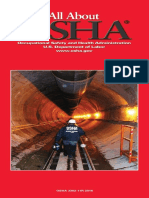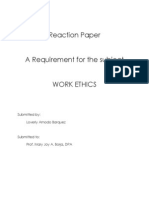0 ratings0% found this document useful (0 votes)
205 viewsOboc Fact Sheet
Uploaded by
api-235855144Copyright
© Attribution Non-Commercial (BY-NC)
Available Formats
Download as PDF, TXT or read online on Scribd
0 ratings0% found this document useful (0 votes)
205 viewsOboc Fact Sheet
Uploaded by
api-235855144Copyright
© Attribution Non-Commercial (BY-NC)
Available Formats
Download as PDF, TXT or read online on Scribd
You are on page 1/ 2
Who are we?
Together we represent the womens health, community
and legal sector in NSW. We work primarily with the
most vulnerable and disadvantaged women in NSW,
however our organisations have broad support across
the state and our work is respected and recognised.
Domesflc vlolence NSW
Famlly Flannlng NSW
F Collecflve
Rape and Domesflc vlolence Servlces Ausfralla
(lormerly NSW Rape Crlsls)
Women's Elecforal Lobby Ausfralla
Women's Healfh NSW
Women's Legal Servlces NSW
Why we urge you to oppose the Bill
There has been no consultation
We are concerned about how quickly this Bill has moved
fo debafe ln fhe Leglslaflve Assembly. There has been
no consulfaflon wlfh fhe women's secfor, and MFs
have not been given the opportunity to consult with
their communities. It is fundamental that when a Bill is
proposed that purports to support women in NSW, that
the views of women are sought.
The amendment is unnecessary
ln May 2010, The Honourable Mlchael Campbell OC
was asked by the then NSW Government to review
fhe Crlmes Acf 100 fo assess whefher fhe currenf
provisions enabled the justice system to respond
appropriately to criminal incidents involving the death of
an unborn child.
Mr Campbell concluded fhaf fhe currenf ollences allow
the justice system to respond appropriately and there
was no reason to change the law or to create a new
offence. He fook lnfo accounf fhe 2005 amendmenf fo
fhe delnlflon ol grlevous bodlly harm ln fhe Crlmes Acf
which included the destruction (other than in the course
of a medical procedure) of the foetus of a pregnant
woman, whether or not the woman suffers any other
harm.
. The Bill gives legal personhood to a foetus
If successful, this will be the rst piece of legislation in
NSW that draws a distinction in personhood between
a woman and the foetus she is carrying. In other
We acknowledge the signicant pain and grief
experienced following harm or loss of a foetus;
however fhe Crlmes Amendmenf (Zoe's Law)
Blll 2013 (No.2) ralses serlous legal and efhlcal
questions for the womens sector.
The Crlmes Acf 100 and specllcally fhe
2005 amendmenf fo fhe delnlflon ol grlevous
bodily harm have been reviewed and found
fo be approprlafe. An ollence ol fhls nafure
causing destruction of a foetus already carries
a maxlmum prlson senfence ol 25 years.
There can be no suggestion that the existing
criminal law is inadequate for responding to
violent offences of this kind. The amendment
before the parliament is unnecessary and
inappropriate.
Crimes Amendment (Zoes Law) Bill 2013 (No.2)
1
jurisdictions, recognising the foetus as an independent
person has been the rst step towards prosecutions of
women where they are deemed to have acted contrary
to the interests of the foetus they are carrying.
If passed, the new law would mean that if someone
caused the destruction of a foetus, they could be
charged with grievous bodily harm to the foetus, instead
of being charged with grievous bodily harm to the
pregnant woman.
The Bill uses the term unborn child, which is incorrect
and emoflve. Fregnancy lnvolves a zygofe and fhen an
embryo in the early stages, which develops into a foetus.
Upon live birth the foetus becomes a child.
Until the foetus achieves an independent existence it
should not be granted legal personhood in its own right.
The Bill has the potential to undermine the
reproductive rights of women
Giving personhood status to a foetus may affect the
lawfulness and accessibility of pregnancy termination in
NSW, particularly for procedures carried out later in a
pregnancy.
Aborflon ls currenfly a crlmlnal ollence ln NSW. The
courts have held that an abortion can be lawfully
performed if it is necessary to prevent serious harm to
the life or health of the pregnant woman, but there is
no clear recognition of this in the Crimes Act. Given the
uncertain legal status of lawful abortion in NSW, it would
be extremely concerning to have a provision in the Crimes
Act that recognises the foetus as a person. We believe
there is a real risk that this provision could be used in the
future to attempt to restrict the circumstances in which
abortions can be lawfully performed.
Reproducflve rlghfs are essenflal human rlghfs fhaf are
conrmed in the Convention on the Elimination of All
Forms of Discrimination against Women (Arf. 1(1)(e)).
If accepted, this legislative change could weaken the
right of women in NSW to access safe, legal pregnancy
termination.
While medical procedures and anything done by, or
with the consent of, the pregnant woman concerned
are excluded in the Bill, this is open to interpretation and
may not be sufcient to protect the rights of the woman
involved.
For example fhe exempflon lor "medlcal procedures"
may not be broad enough to cover medical (as distinct
lrom surglcal) aborflons. Medlcal aborflon has recenfly
recelved bofh TGA and FBS llsflng. There ls also no
clarity around consent and the recent Senate Inquiry into
the Involuntary or Coerced Sterilisation of People with
Disabilities in Australia highlighted the issues that exist in
regard to consent for medical procedures for people
with disability.
For further information:
http://www.womenslegalnsw.asn.au/law-and-policy-
relorm/zoes-law.hfml
Contact
Melanle Fernandez, Chalr, Women's Elecforal Lobby
Ausfralla, 0402 334 28
Georgla Foffer Bufler, Convenor, F Collecflve,
0488 217 535
Denele Crozler, Chlel Execuflve, Women's Healfh NSW,
0414 780417
Karen Wlllls, CEC Rape and Domesflc vlolence
Servlces Ausfralla, 041 43807
Jodl McKay, Dlrecfor, Communlcaflons, Governmenf
and Communlfy Allalrs, Famlly Flannlng NSW,
0414873
Carolyn Jones, Senlor Sollclfor, Women's Legal
Servlces ln NSW, 8745 00
We urge you not to support this Bill.
2
http://ourbodiesourchoices.good.do
You might also like
- NSW Labor Lawyers Open Letter - Zoe's LawNo ratings yetNSW Labor Lawyers Open Letter - Zoe's Law3 pages
- Abortion: Pro-Choice Pro-Nothing Pro-Life.No ratings yetAbortion: Pro-Choice Pro-Nothing Pro-Life.4 pages
- Decriminalising Abortion in South AfricaNo ratings yetDecriminalising Abortion in South Africa25 pages
- Termination of Pregnancy Rights and FoetNo ratings yetTermination of Pregnancy Rights and Foet33 pages
- Abortion Position Paper - PDF Shirley RichardsNo ratings yetAbortion Position Paper - PDF Shirley Richards54 pages
- Effects of Reproductive Health Bill in The Philippines0% (1)Effects of Reproductive Health Bill in The Philippines7 pages
- Why Is It Essential To Amend The Abortion Law in Sri Lanka?: A Medico-Legal Perspective On Criminal Abortions and VictimizationNo ratings yetWhy Is It Essential To Amend The Abortion Law in Sri Lanka?: A Medico-Legal Perspective On Criminal Abortions and Victimization6 pages
- An Argument For Foetal Protection WithinNo ratings yetAn Argument For Foetal Protection Within15 pages
- The Mulungushi University Law Association Journal - 2023No ratings yetThe Mulungushi University Law Association Journal - 202347 pages
- 01-13-09 AlterNet-Repealing The Global Gag Rule Is Only The First Step by Patty SkusterNo ratings yet01-13-09 AlterNet-Repealing The Global Gag Rule Is Only The First Step by Patty Skuster2 pages
- Equal Liberty: Assisted Reproductive Technology and Reproductive EqualityNo ratings yetEqual Liberty: Assisted Reproductive Technology and Reproductive Equality34 pages
- Women vs. American Supreme Court: The History of Abortion LegislationFrom EverandWomen vs. American Supreme Court: The History of Abortion LegislationNo ratings yet
- Abortion Rights - Judicial History and Legislative Battle in the United StatesFrom EverandAbortion Rights - Judicial History and Legislative Battle in the United StatesNo ratings yet
- Abortion and A Right To Health in International Law: L.C. V PeruNo ratings yetAbortion and A Right To Health in International Law: L.C. V Peru17 pages
- VELVET REVOLUTION SANCTIONED LAWFUL MORATORIUM Autosaved 1No ratings yetVELVET REVOLUTION SANCTIONED LAWFUL MORATORIUM Autosaved 148 pages
- Is_viability_viable_Abortion_conceptual_confusioNo ratings yetIs_viability_viable_Abortion_conceptual_confusio29 pages
- "Abortion Is Murder! All Life Is Sacred!" Said A White, Bearded Man Wearing Leather ShoesNo ratings yet"Abortion Is Murder! All Life Is Sacred!" Said A White, Bearded Man Wearing Leather Shoes4 pages
- Center For Reproductive Rights State Midyr Wrapup 2011 8.10.11No ratings yetCenter For Reproductive Rights State Midyr Wrapup 2011 8.10.1115 pages
- Argumentative Essay About Legalization of AbortionNo ratings yetArgumentative Essay About Legalization of Abortion1 page
- The Reality of Abortion in The Philippines: Views, Religion, and AbortionNo ratings yetThe Reality of Abortion in The Philippines: Views, Religion, and Abortion5 pages
- Amendment Process in USA and Switzerland Roshni Thammaiah NotesNo ratings yetAmendment Process in USA and Switzerland Roshni Thammaiah Notes11 pages
- University of Pangasinan Inc V FernandezNo ratings yetUniversity of Pangasinan Inc V Fernandez2 pages
- The Registration of Births and Deaths Act, 1969No ratings yetThe Registration of Births and Deaths Act, 19697 pages
- Roe v. Wade - 410 US 113 (1973) - Justia US Supreme Court CenterNo ratings yetRoe v. Wade - 410 US 113 (1973) - Justia US Supreme Court Center62 pages
- Affidavit of Acknowledgment/Admission of PaternityNo ratings yetAffidavit of Acknowledgment/Admission of Paternity5 pages
- The Father of Torrens System in The PhilippinesNo ratings yetThe Father of Torrens System in The Philippines13 pages
- Bennett, Coleman & Co. LTD.: India Sahu Jain The Times GroupNo ratings yetBennett, Coleman & Co. LTD.: India Sahu Jain The Times Group7 pages
- Foreign Consular Offices in The United StatesNo ratings yetForeign Consular Offices in The United States136 pages
- Te, 'Wall 144 C I - T9.7R7U Ofcar: - Rrq7 Cilgpi - SNo ratings yetTe, 'Wall 144 C I - T9.7R7U Ofcar: - Rrq7 Cilgpi - S11 pages
- Table of Specifications For Philippine Politics and Governance100% (1)Table of Specifications For Philippine Politics and Governance3 pages
- G.R. No. 138238. September 2, 2003 Eduardo BALITAOSAN,, Petitioner, v. THENo ratings yetG.R. No. 138238. September 2, 2003 Eduardo BALITAOSAN,, Petitioner, v. THE4 pages
- Extension of Parental Leave Approval Letter TemplateNo ratings yetExtension of Parental Leave Approval Letter Template3 pages
- Chapter - 4 Factors Responsible For Crimes Against Women: Swami VivekanandNo ratings yetChapter - 4 Factors Responsible For Crimes Against Women: Swami Vivekanand39 pages
- (U//FOUO) Domestic Terrorism and Homegrown Violent Extremism LexiconNo ratings yet(U//FOUO) Domestic Terrorism and Homegrown Violent Extremism Lexicon5 pages

























































































